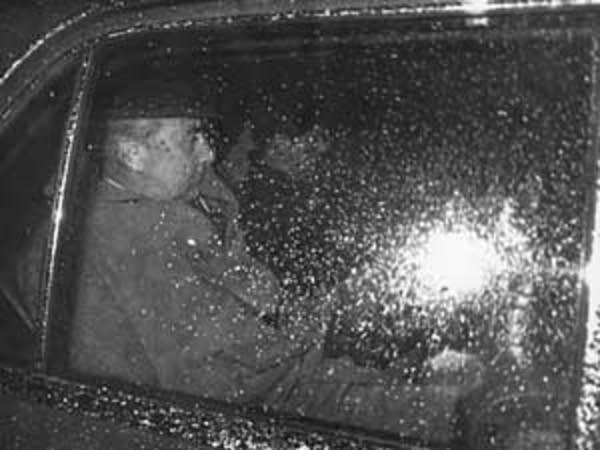A question of conviction
Go Deeper.
Create an account or log in to save stories.
Like this?
Thanks for liking this story! We have added it to a list of your favorite stories.

The assassination of Robert Kennedy in June 1968 pushed an already divided Democratic Party into further disarray. For Eugene McCarthy, it was the darkest period of the campaign.
MCCARTHY DISTRESSED, MOODY AFTER ASSASSINATIONS
"Most people who were at all following anything that was going on felt exhausted," author Mark Kurlansky said.
The year had unfolded in a series of shock waves. And the death toll still climbed in Vietnam. Kurlansky described the tragedy of 1968 as almost too much for the American psyche.
Turn Up Your Support
MPR News helps you turn down the noise and build shared understanding. Turn up your support for this public resource and keep trusted journalism accessible to all.

"A kind of despair set in, between the assassination of Martin Luther King and the assasination of Robert Kennedy, that I think has never left this country," said Kurlansky.
Eugene McCarthy's face showed that despair on June 12.
"Well, ladies and gentlemen, I've called you all here today to announce that I'm resuming the campaign," he announced on that day.
Just four days after Robert Kennedy's funeral, McCarthy held a news conference in Washington, D.C., to announce a limited campaign schedule.
"It's slightly different because of the assassination, but not very different from what it would have been after the primaries had ended, in any case," McCarthy said.
In a 1969 oral history interview, speechwriter Jeremy Larner remembered McCarthy as a dark and moody candidate after the death of Robert Kennedy.

"The assassination obviously did something to him, and he looked extremely distressed psychologically," Larner said. "And I often wondered whether he was afraid of assassination, which wouldn't have been unreasonable at all with all the Secret Service guys around. For a couple of weeks we found ourselves scanning every crowd."
"But I also think there was something else on his mind, and that he was deeply depressed, and he continued so for most of the summer," said Larner.
"I'M WILLING TO TAKE THE JOB"
McCarthy appeared to be was moving ahead without his earlier conviction. The question of McCarthy's commitment came up in late June, when he made an appearance on the Tonight Show. Even host Johnny Carson wondered if McCarthy really wanted to be president.
"Why does a man pursue the job, a grueling job, of the presidency of the United States?" Carson asked. "I think you've said yourself that the job has become almost too big for one man. And it may sound like a very naive question, and I don't mean it to be naive, but why why does somebody want that job?"

"I never said I wanted it, really," McCarthy responded. "I've gone so far as to say I'd be willing to take it. And I think that's really as far as anyone should go."
"But you do want it, don't you?" Carson asked.
"Well, I'm willing to take it. And I've worked rather hard to improve my willingness since New Hampshire," McCarthy replied. "But my explanation was -- I thought the issues were such that someone had to raise them. And if you've been in politics for 20 years, I think there comes a time you take some chances on it."
McCarthy kept traveling the country and making speeches. He still drew large, enthusiastic crowds. But he was far behind Vice President Humphrey in the delegate count. Biographer Dominic Sandbrook says the campaign was essentially dead.
MCCARTHY KNOWS IT'S OVER
"McCarthy knew that himself, his campaign managers knew it," said Sandbrook. "The students who worked for him thought it was still alive -- they wanted him to go on fighting to the last, but that had never been McCarthy's style. He looked at the numbers; he knew that Humphrey had the delegates."

"What he could have done is made more of an issue of the war, gone into the convention with a groundswell of opinion behind him, and really sort of fought for a different platform on the Vietnam War. But he effectively gave up," said Sandbrook. "And the other problem was that Humphrey was his old colleague. It was very difficult for him to campaign against Humphrey, given that they had been through so much together and that Humphrey, at the beginning, had been his political patron."
The Democratic National Convention was approaching, and McCarthy's supporters were restless. During an Aug. 13 appearance on the Joey Bishop television show, McCarthy heard from a supporter who was in the studio audience.
"Senator, so many of us have been so frustrated by our feelings for you and the support that we have for you and the kind of work that we've done, with the delegates seemingly not paying much attention to it. And we've been going out and demonstrating and writing letters and signing petitions and making as much noise as we can. And many of us had planned to go to Chicago to continue to demonstrate, to hope that the delegates would listen to us. And I understand today that you asked us not to go to Chicago, which is breaking our hearts. Could you explain it?"
"Well, I said I thought it might be a mistake to have too many people come to Chicago," McCarthy answered. "I said it would do as well, I think, if back in your own states you could indicate the popular support."
Dear reader,
Political debates with family or friends can get heated. But what if there was a way to handle them better?
You can learn how to have civil political conversations with our new e-book!
Download our free e-book, Talking Sense: Have Hard Political Conversations, Better, and learn how to talk without the tension.




